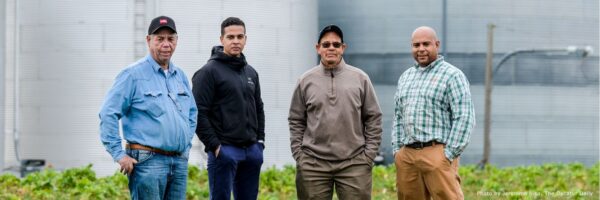Bridgeforth Farms is not just a Black-owned, fifth-generation crop operation in Tanner, Alabama — which in itself is a major accomplishment.
The brand grows various crops such as corn, soybeans and even cotton. Often when we think of cotton, we can’t help but recognize its historical significance and the enslaved Black people that were used to cultivate its crops for centuries.

With only 1.4 percent of American farms being Black-owned and less than 1 percent Black-owned cotton farms, Bridgeforth breaks the mold with its business model and what it means to be a Black-owned farm.
Bridgeforth, however, has stayed afloat since 1857, despite its struggles, by developing business strategies rooted in creativity and ingenuity.
It’s part of the reason Bridgeforth secured a partnership with Target, which kicked off in February with Black history-inspired clothing made exclusively with Bridgeforth cotton.
“Essentially, it started off as just a raw materials project,” Kyle Bridgeforth, a partner, and accounts manager at Bridgeforth Farms, told Finurah. “Target was looking for a more diverse supply chain. They were looking to directly buy from a raw materials provider, so we kind of fit the bill for both. We were the first people that Target had ever bought raw cotton from. So that’s kind of where the conversation started.”
Part of Target’s Racial Equity Action and Change commitment includes an aim to help combat racial disparities by spending $2 billion by 2025, with Black-owned businesses.
But for Bridgeforth, Target is only the beginning. A pandemic and five generations later, Bridgeforth is still thriving and has done so by using these key business practices.
Flexibility Is Key to Keeping Ideas Fresh
When certain crops didn’t grow in supply the way they were expected, Bridgeforth wasn’t afraid to try something new, which reflects its attitude toward most issues.
“We’re willing to change and adopt new technologies, new approaches, new customers, engaging ourselves in new spaces outside of the agricultural world,” said Kyle Bridgeforth. “I think it’s really been what kept us going through the hard times, not being stuck in our ways, operationally at least.”
Bridgeforth prides itself on taking the time to use the best economic practices and genetics for its agriculture industry.
Company leaders constantly are asking themselves, “How can I get the most out of something I’m putting in the ground,” Kyle Bridgeforth said. “But creativity comes in with who you’re dealing with. What kind of considerations do you have? What sacrifices do you want to make to create that material in a certain way?”
This open-mindedness was part of what helped get the company through the pandemic. During its height, the day-to-day stayed somewhat the same for partners, employees and on-site farm personnel, except for the new health and safety protocols put in place to combat the virus. But the move to virtual communication definitely shifted company culture, Kyle Bridgeforth shared.
“The farm hadn’t had a single Zoom or virtual meeting before the pandemic,” he said. “Things changed to the point where we were having several Zoom meetings a week, just like everybody else. Meetings we had on the calendar every year transitioned to virtual.”
Meeting this new, almost mandatory, digital communication mode, he added, meant Bridgeforth Farms “really had to catch up.”
In such a standardized industry like agriculture, he said Bridgeforth finds it’s essential to explore all business avenues and take the time to improve each one.
The Reality of Running a Business With Your Family
For Bridgeforth Farms, family is the backbone of its 10,000-acre business. Kyle Bridgeforth said that working with his relatives has made working at Bridgeforth his most authentic business venture.
“When you’re working with family, it’s an environment where you work in extremes,” he explained. “You can enjoy something to the utmost and can be yourself because you’re with people you’ve known your whole life. Here there’s not a lot of filter working with family. They don’t hold back as they would in a normal office space.”
There are probably eight to 10 family members working on the farm on any given day. Kyle Bridgeforth grew up on the farm between summers and after school. When he signed on as a partner at 18, he went to college and explored other financial spaces before returning to the farm full-time.
The farm itself is essentially where all his family lives, said Kyle Bridgeforth.
“I see a ton of a family every day,” Kyle Bridgeforth said. “So it makes it more of a lifestyle than a job. I wouldn’t say it’s for everybody. But it’s an experience where, you know, I definitely hope I have with my son. I hope he and I work together one day.”
Much like family, Kyle Bridgeforth has a personal connection to the company with which he shares his last name.
“You really want to protect that company and make sure things go correctly,” he said. “You want to make sure you put out the best quality product you can, so there’s a lot of pride.”
With such varying degrees of generations, Kyle Bridgeforth is no stranger to the push and pull that sometimes happens when it comes to ideas or decisions.
“As a younger person, coming into a business with a generation ahead of you,” said Kyle Bridgeforth. “Some of the growth goals and things you want to pursue were certainly different. It’s a family business, so there are obstacles and challenges and personalities that come along with that.”
Running a Farm Means Growing More Than Crops
When he first joined the business, Kyle Bridgeforth had his own preconceived notions of what it would be like to operate a farm.
“I had this worry that working on the farm I grew up on would somehow trap me in this bubble, in my own small microcosm, and not allow me a lot of space to see what else is out there and engage with other communities and industries,” Kyle Bridgeforth said. “I was pleasantly surprised that it was the exact opposite.”
He has traveled all over the world and has been to every state throughout his career.
“My expectations were incorrect,” he said.
For Bridgeforth, there isn’t one specific crop that he absolutely loves. With a degree in business and economics and having experience working in trade and finance, he’s most impressed by how the farm can be used as an “economic engine.”
For him, Bridgeforth Farms is a source of pride.
“There’s not a lot of Black people in the farming industry. There is actually an extremely small amount of us left. So the fact that we’re still here — we’re still going.”




